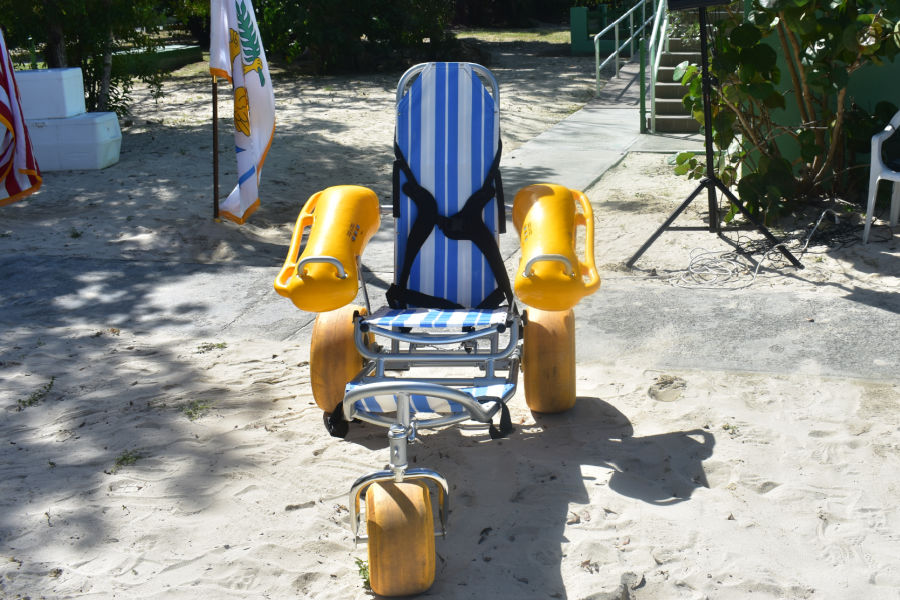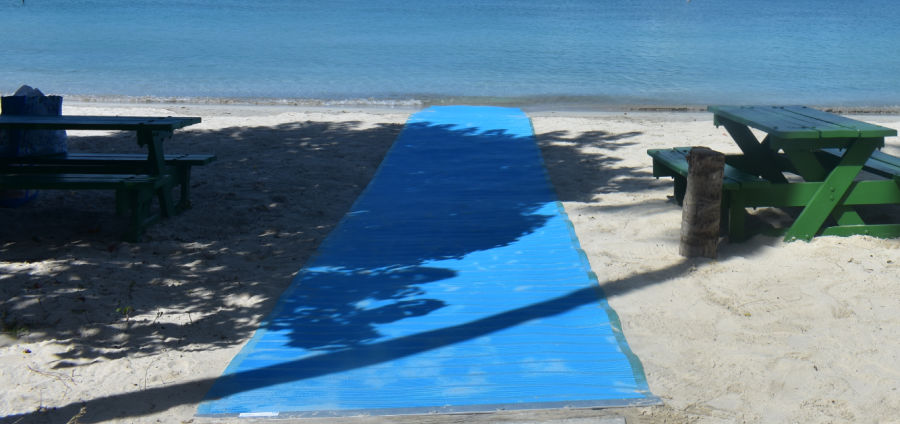Natalie Rhymer was the first resident in the territory to use the Waterwheels and Access Mat to get into the water. Photo Credit: KYLE MURPHY FOR VI CONSORTIUM
ST. THOMAS — In October, the 33rd Legislature passed a bill that would help make beaches more accessible to disabled persons in the Virgin Islands. On Tuesday, government officials and Magens Bay board chairperson ceremonially cut the ribbon of the first beach to benefit from the bill in the territory.
![]()
Governor Albert Bryan, Sports Parks and Recreation Commissioner Calvert White, Territorial American with Disabilities Act Coordinator, Julien Henley Sr., Magens Bay Authority Chairwoman, Katina Coulianos, Department of Planning and Natural Resources Commissioner, Jean Pierre Oriol, and Senator Steven Payne were all part of the ribbon-cutting ceremony that took place on Tuesday morning.
“The theme for today and most of the things we do around disability is those that feel it, know it," Mr. Bryan said from the outset of his remarks. He said most people don’t understand what those with disabilities go through unless they have a family member that experiences the struggle of everyday life, or had to experience being disabled themselves.
 Waterwheels is a floating beach wheelchair which enables people with disabilities to access soft terrains. Waterwheels also float in water (kyle Murphy for VI Consortium)
Waterwheels is a floating beach wheelchair which enables people with disabilities to access soft terrains. Waterwheels also float in water (kyle Murphy for VI Consortium)
The access way is between Shed 2 and the bathrooms closest to the bar and restaurant at Magens Bay. Utilizing AccessMat and WaterWheels, disabled people can wheel directly into the water. AccessMat is a lightweight and durable, 100 percent polyester rollout matting system specifically developed to create a permanent or temporary route for individuals of all abilities. It enables a safe, comfortable pathway for safe traffic on sand. Waterwheels is a floating beach wheelchair which enables people with disabilities to access soft terrains. Waterwheels also float in the water so the person in the chair does not have to get out when in the ocean, making the process easier.
Mr. Henley was the first person that told Mr. Bryan about waterwheels and convinced him that he needed to do more for people with disabilities. There is “no better example of an advocate than Julian Henley," said the governor.
“This happened because of the push and drive that the ADA coordinator had to make our beaches more accessible,” said Mr. White, referring to Mr. Henley.
Magens Bay is the first beach in the territory to benefit from Bill No. 33-0220, which requires the commissioner of Sports, Parks, and Recreation to construct ramps or walkways for at least two beaches on each island that would allow persons with disabilities to access the beaches as part of the Virgin Islands Beaches Initiative.
 Access Mat is a lightweight and durable 100 percent polyester roll out matting system specifically developed to create a permanent or temporary route for individuals of all abilities. (Kyle Murphy for VI Consortium)
Access Mat is a lightweight and durable 100 percent polyester roll out matting system specifically developed to create a permanent or temporary route for individuals of all abilities. (Kyle Murphy for VI Consortium)
Coki Point, Brewers Bay, Cramer's Park, Fort Frederik, and Vincent Mason Pool are next on the Department of Sports, Parks and Recreation’s list to make more accessible in the near future.
“When we started this venture it just made sense to place these mats on one of more populated beaches," Mr. White said. He said the project came together by working with other government agencies, as it was funded in part through a Dept. of Planning and Natural Resources grant. Sen. Payne secured additional funding through the legislative process.
Ms. Coulinos, the Magens Bay board chair, saw the walkway for wheelchair access as a step in the right direction.“These features are the start of improved accessibility,” she said during her remarks, thanking all involved. She added that future improvements would include hard-surface walkways to sheds and tables, and handicap parking.
Mr. Oriol, the D.P.N.R. commissioner, said, “The vision for this administration is to improve the quality of life. While it might not be a $50 million project to improve the roadways, it does improve the quality of life in the territory.”
The original bill was sponsored by Senators Payne and Oakland Benta and passed in October. The Consortium's coverage of the bill's approval can be found here.
Said Mr. Payne, “We have dropped that ball on our disabled and elderly community... This event is important but should have happened years ago.”
Mr. Payne told the governor that he couldn’t have found a better ADA coordinator, and attributed the bill as Henley's “brainchild.”

